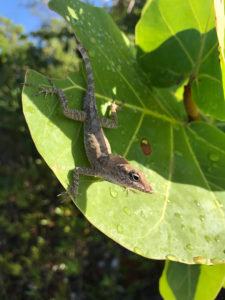And now scientists know they even caused a kind of artificial selection - by changing natural selection. For tropical anole lizards living on the more remote cays of Turks and Caicos, there was only the ones who survived — and the ones who didn’t. Using data collected just before the storms hit, and again weeks afterward, biologists were able to demonstrate for the first time the effects of hurricane-induced natural selection.
The storms had been a “selective event” — an event with the power to change the course of life not just for the lizards that had weathered them, but potentially for the generations that followed. After the storms, the team spent two days collecting nearly 100 lizards on two separate islands, then measured their forelimbs, hindlimbs and core body lengths, and took pictures of their toe pads. The vital statistics of the survivors were compared with the measurements of the general lizard population that had been collected before the storm.

Anolis scriptus Photo: Colin Donihue, Washington University of St. Louis
They found that found that the survivor populations on both islands had larger toe pads on both their forelimbs and hindlimbs. The survivors had proportionately longer fore legs than the initial/pre-hurricane population, while the long bones in between their hips and knees on their back legs (their femurs) were shorter. The survivor population had smaller bodies, too. The observations were statistically significant and consistent at both island sites.
Some contend that in natural disasters, devastation is so massive that mortality is indiscriminate, not favoring some individuals over others. Others contend that a hurricane will cause selective mortality: individuals with certain traits survive better than individuals with different traits.
The results of this study — that the island populations of lizards both changed significantly, and in the same way from before the hurricanes to after — suggest that natural selection favored individuals with certain characteristics, though there are other possibilities.
Perhaps the hurricane blew in lizards with bigger toepads and shorter hindlegs from another island. Or perhaps the act of clinging to the branches in high winds actually caused their forelegs to get longer.






Comments